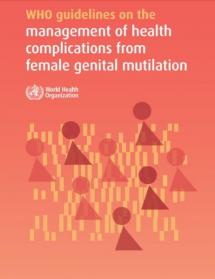WHO Guidelines on the Management of Health Complications from Female Genital Mutilation
These guidelines are intended primarily for health-care professionals involved in the care of girls and women who have been subjected to any form of female genital mutilation (FGM). This document also provides guidance for policy-makers, health-care managers and others in charge of planning, developing and implementing national and local health-care protocols and policies. The information contained in this document will also be useful for designing job aids and pre- and in-service professional training curricula in the areas of medicine, nursing, midwifery and public health for health-care providers caring for girls and women living with FGM.
Development of these guidelines led to the establishment three central principles:
- Girls and women living with FGM have experienced a harmful practice and should be provided quality health care
- All stakeholders – at the community, national, regional and international level – should initiate or continue actions directed towards primary prevention of FGM
- Medicalization of FGM (i.e. performance of FGM by health-care providers) is never acceptable because this violates medical ethics since (i) FGM is a harmful practice
Included are many recommendations for SBCC approaches and specific interventions.
Last modified: March 25, 2019
Language: English

